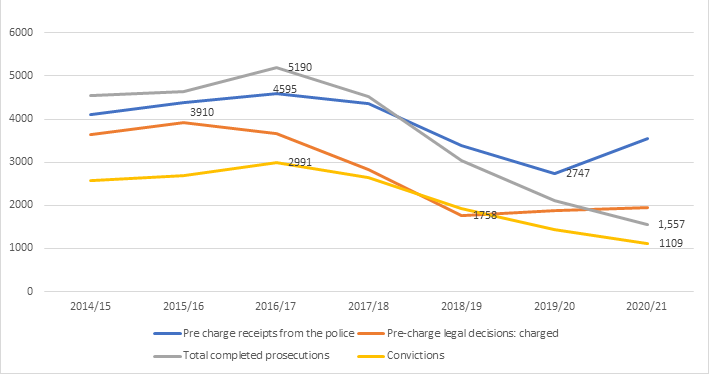CPS data shows how far government has to go to meet promises to rape victims
Victims’ Commissioner criticises the CPS as she says "it is hard to see even the green shoots of a recovery" in rape prosecutions.
The CPS data for quarter 4 of 2020-2021 reveals:
- Police recorded 55,696 rapes in the year to 2020-2021, which is a 6% decrease on 2019-20.
- The CPS received 3,539 cases from the police, an increase of 792 (29%) on 2019-20.
- The CPS charged 1,955 cases (pre-charge legal decisions), an increase of 88 (5%) on 2019-20.
- The CPS conviction rate rose to 71% in 2020-21, which is 3 percentage points higher than in 2019-20 and continues a steady rise from 2017-18.
On the ambition of reaching charging levels equal to those of 2016-17, in the latest year:
- The CPS received 23% less cases from the police than they did in 2016-17.
- The CPS made 47% fewer pre-charge legal decisions than they did in 2016-17.
- The CPS completed 70% fewer prosecutions (likely due to Covid).
- At the current rate of progress of around 100 more charging decisions each year, it would take around 17 years for pre-charge legal decisions to be at the level they were in 2016-17.
The Victims’ Commissioner for England and Wales, Dame Vera Baird QC, says: “The government’s recently published rape review was frank in pointing to clear deficiencies in the criminal justice system’s approach to rape and set an ambition to reverse these shameful trends by returning the volume of charges to 2016/17 levels. The CPS data, released today, reveals in stark terms just how far they have to go to meet this ambition and live up to their promises to victims.
“In the year to March 2021, the police referred some 3,539 cases on to prosecutors for a charging decision – representing a 29 per cent rise on the year prior. The CPS charged 88 more cases than in 19/20 (a 5 per cent increase), but this is just a fraction of the rise in police referrals of almost 800. In total, fewer than two thousand cases (1,955) received a charge and, in the year to March 2021, we saw just 1,109 rapists convicted.
“Faced with these odds, it is perhaps no wonder why many – too many – decide to not come forward to report in the first place. In my 2020 survey of rape victims, just 14 per cent believed they would receive justice by reporting to the police. Indeed, this may be reflected in the 6 per cent fall in reporting to the police seen in the 2020/21 data.
“At this current rate of progress, whereby we see around 100 more charging decisions by the CPS each year, it would take more than 17 years for charging to reach the level we last saw in 2016/17. We were told this will be achieved by the end of this Parliament, possibly as late as 2024. At the current glacial pace, the government is set to meet its target in 2038 – some four Parliamentary terms away. Victims will continue to be failed if we do not rapidly and urgently up the ante across the board.
“The police statistics do show an improvement in the police response to rape but there is no doubt there remains a long way to go. The roll-out of Project Bluestone across four further forces this year as one of the rape review’s recommendations will offer hope that police rape investigations will improve, as the investigations become more suspect-focussed. The pilot has shown this approach has real potential to improve victims’ experiences and drive better investigations.
“But it remains to be seen where improvements in CPS charging will come from. Five years on from 16/17 and it is hard to see even the green shoots of a recovery. In 2020/21 the CPS charged in 47 per cent fewer cases than in 2016/17. With the CPS effectively discarding over half the cases it dealt with last year, we are once more provided with evidence that the root of the problem lies at the door of the CPS. It further brings into question when and how the government will exercise some accountability over the CPS, an organisation that has rightly been publicly pilloried again and again for betraying victims of this heinous crime. We are well past excuses: it is high time for real on the ground delivery – and genuine accountability.”

